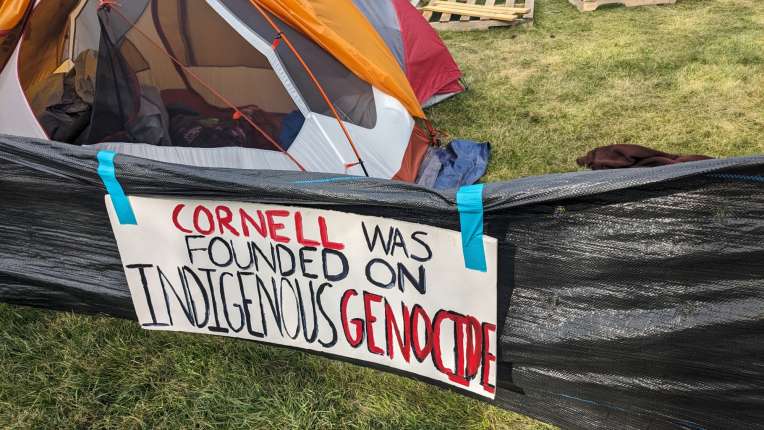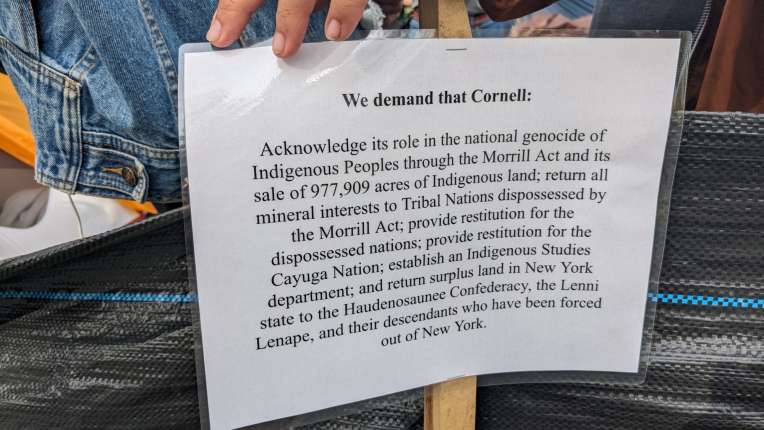The Cornell Liberated Zone and its Afterlives
From the Series: Counter Archives: Fieldnotes from the Encampments
From the Series: Counter Archives: Fieldnotes from the Encampments



On Sunday, May 26, 2024, Cornell faculty and staff held an alternative graduation for graduating students who had participated in the encampment and were engaged in the campus anti-genocide and divestment movement. We heard some of the most tender, powerful speeches from mothers who spontaneously spoke up, celebrating their children’s activism and the care they showed for one another and the world. “I raised my daughter to live in harmony with others,” said one mother reflecting about her daughter’s arrest for occupying the hallways of the president’s office. “I am glad she has chosen to forsake the small-h harmony of keeping up the social decorum for the capital-H Harmony of the struggle for making the world a better place.” These words are written from memory as my impromptu audio recording is grainy.
Responding to world powers that actively support the genocide on Palestinians (rather than merely looking away from it, as is usual), many of us have recalibrated our commitments. The compilation of documents and pictures gathered here honors the collective organizing of Cornell students first, and the faculty, staff, alumni, and local community members second, who have produced their analyses before, during, and after the encampment: speeches, presentations, teach-ins, discussions, demands, resolutions, artwork. Some of these have been archived, others are ephemeral, but all live on in the imprint they left on our hearts and, hopefully, our resolve.
None have stopped the genocide. We live with an ongoing contradiction: we do not have a blueprint for stopping U.S.-backed Israel’s wars or other racial wars to come, but nor shall we stop. “Whatever sand you can throw on the gears of genocide,” writes Rasha Abdulhadi, “do it now.”
The Liberated Zone demands are an important public record because they showcase what the encampment stood for. These demands stand out because of their emphasis on mutual liberation and Cornell-specific histories of profit from genocide. Students demand restitution for Cornell’s foundational exploitation of and profit from Indigenous dispossession and genocide as well as divestment from military companies involved in Israel’s genocide on Palestinians and other war crimes around the world.
Another public record of Cornell’s Liberated Zone is to be found in the student activist and supportive faculty reflections, as well as in the articles
and photo essays published in the not-so-activist
student newspaper. These reflections are intertwined with a thick archive of repression. Cornell targeted students with suspensions
and evictions. By isolating select students and removing them from the encampment, it tried to rob them of the solace and joy of the encampment community. Suspended: you hang in the air, and your feet do not touch the ground.
“Repression” does not fully capture Cornell’s cruelty which relied on administrative violence rather than brute force. Students were suspended without due process, despite faculty pushback. Worse, Cornell reduced them to bargaining chips and held them hostage: the suspensions, they were told, would be lifted if the encampment disbanded. In turn, were the encampment to escalate by occupying a building, the suspended international students would be deported. This meant that Cornell slated the targeted students for sacrifice and robbed them of rights. Trying to pit the suspended students against the encampment, the administration also wanted to divide and subdue the movement.
Cornell’s authoritarian turn started well before the encampment. It took off when the university was threatened with the withdrawal of its tax-exempt status. Cornell complied with the “congressional crooks.” In early spring 2024, Cornell suspended not only its students, but its policies—the lawful procedures that protect students’ rights. Cornell is not alone. Declaring protestors a threat to public safety, university administrations manipulate disciplinary procedures and deploy emergency measures. We are in a state of exception that tells us how the racial war is fought domestically and internationally.
We witness the afterlives of the encampment in ongoing student activism, but the suspension of lawful procedures has also escalated. A PhD student in Africana Studies, Momodou Taal, has been singled out for deportation without ever having received due process. The internal struggle continues alongside the movement for divestment and anti-imperial futures. Solidarities too are intertwined domestically and internationally.










